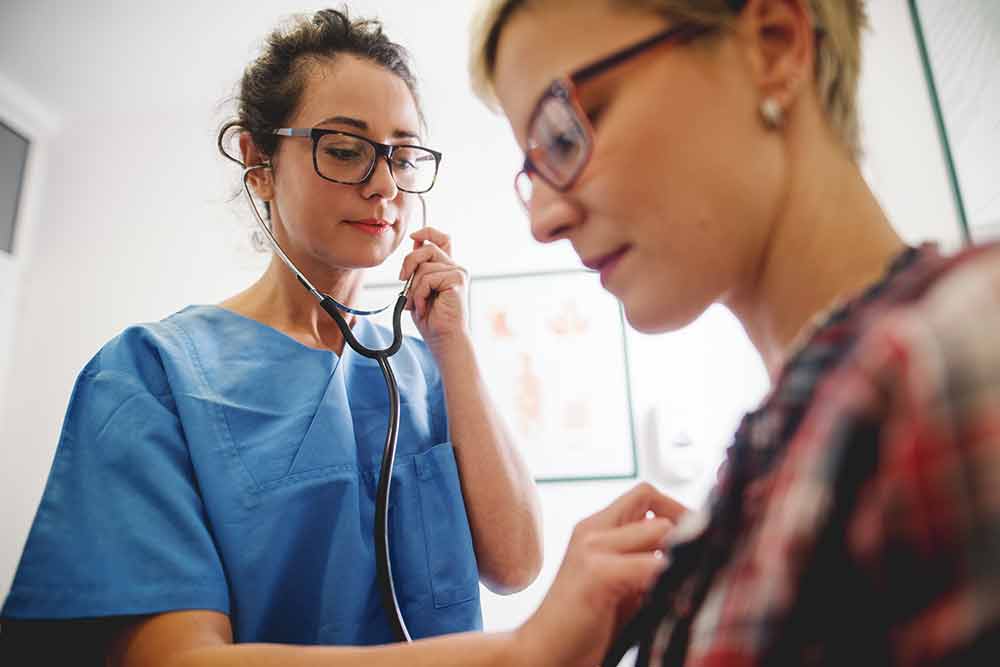Interview with a Clinical Vascular Scientist trainee
- Published on
- 19th December 2016
- Filed under
- STP
Lily Bishop is a Clinical Vascular Scientist trainee at the Royal Free Hopsital in London
How did you get into your current career e.g. education and training? What attracted you to the career?
After really enjoying Biology at A level, and knowing that I wanted to work with patients in my career but unsure of in what capacity, I decided to keep my options open and study Biomedical Sciences BSc at UCL. This was fantastic as I was able to continue working as an Auxiliary Nurse alongside my degree. I worked in many different types of wards and departments but I found clinics the most enjoyable. I have always wanted to have a career as a doctor or nurse, or something in between that would also utilise my scientific mind-set… Then I heard of the physiological sciences roles of the STP!
Why did you choose the STP? What are you most proud of?
The STP (vascular specialism) was the perfect combination of paid employment in a healthcare setting involving direct patient contact, learning a new specific skillset for a specific job role, working towards a Master’s qualification, having the opportunity to go on a 4-6 week elective, and of course being a student in Newcastle again(!) for several weeks/year.
I am most proud of successfully completing my first year exams and OLAT competencies as they proved very hard work. I do not have a physics background so there was much to learn, however it was totally worth it as I feel my confidence with scanning and my understanding has already increased drastically.
What are the major issues or myths around your role? What’s a typical day like? What are the best bits? What are the challenges? What might you change about your role?
People who are unfamiliar with Clinical Vascular Science often do not understand what we do and if I could change something about my role, I’d enhance the publicity of this exciting and rewarding career. We perform routine and urgent ultrasound scans on the vascular system all over the body, ranging from aneurysms, fistulas, strokes and TIAs, peripheral arterial disease, varicose veins and DVTs. The analysis and interpretation of what you’re seeing, as well as the precision and dexterity associated with the sonographic technique, presents a unique set of challenges. In addition, the ability to recognise the subtle abnormalities and pathology and to interpret intricate Doppler waveforms is all necessary to piece together the logic puzzle to form the correct diagnosis.
Any qualifications or professional development that has helped you develop in your role?
Every week I have the option to attend the hospital Vascular MDT meetings which is great for understanding how our role fits into the patient pathway. It is also interesting to contribute to and discuss with Doctors these complex patients’ treatment plans based on the results of various tests.
In addition, I have had the opportunity to attend the annual Vascular Symposium held at Charing Cross, London, where upcoming research is presented, workshops are held, and interesting patient cases are debated. This is also a great networking opportunity! Similarly, I am a trainee member of the Society of Vascular Technology, the professional body with which Vascular Scientists register; I am excited to attend their 3-day AGM next year in Manchester.
For the academic Master’s component of the STP, there are lectures, coursework and exams that are all set by an academic institution, such as Newcastle University. I have made very good friends in my course in Newcastle; we are all doing the same course but in different hospitals across the UK. It is reassuring, fun and good to know where you’re at compared to others in your training. All trainees are entitled to one study day a week throughout the three years which allows you to focus time on learning the anatomy and physics lectures, revising for exams, and completing work-place based competencies and coursework.
The London Healthcare Science Trainee Network is also a fantastic way to meet new people at the socials, get involved in the promotion of Healthcare Science Trainees and complete OLAT competencies during the winter and summer events. I am the rep for Physiological Sciences trainees and therefore attend meetings with the board and help organise such events.
If you were to summarise the main skills/attributes or qualities for this role into 3 words, what would they be?
You need to have good time-management, hand-eye coordination/dexterity, and be personable/caring.
What are your plans after the STP? Where do you see yourself heading?
After the STP, I aim complete my SVT accreditation and also become proficient in the more complex types of scan undertaken by Vascular Scientists which are not covered by the STP curriculum, such as renal artery scans. Once I feel ready, I’d also love to gain experience overseas by working abroad for a year.
Once settled, I would love to be the Lead Clinical Vascular Scientist in an NHS Trust and maybe carry out some private work on weekends/evenings.
Do you have any hobbies or interests? How have they helped you in your career? What things help you to maintain a healthy work-life balance?
In my spare time, I enjoy seeing friends and visiting family, going on countryside walks, playing tennis and keeping up with the Spanish I learned many years ago. These activities are refreshing and relaxing – it is essential to keep on top of work and assignments but also not to forget to take a break on weekends and have fun. If you use your study days effectively then you will have a healthy work-life balance.
